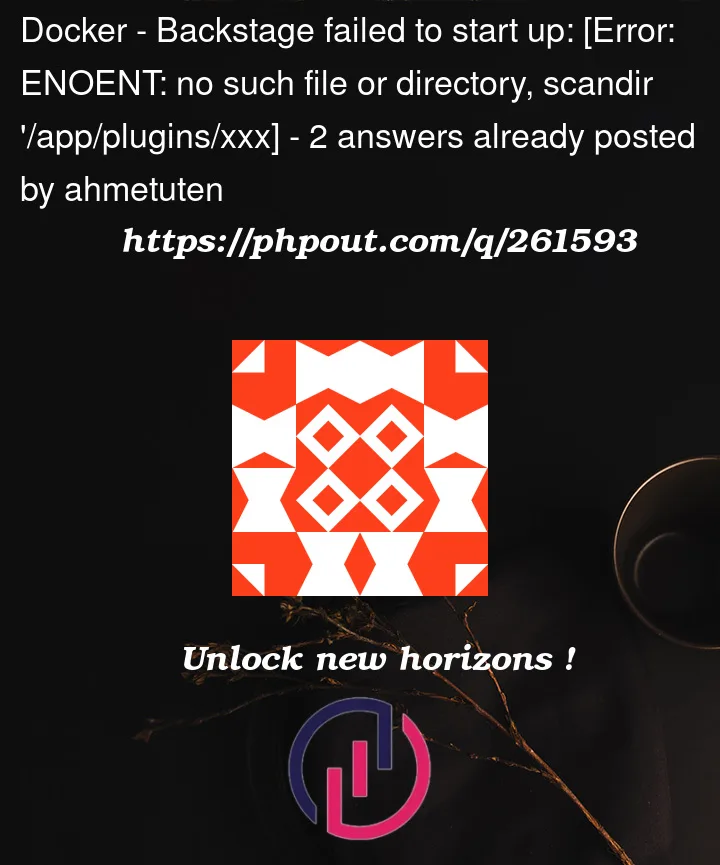I have a plugin named "inventory-backend". It includes Knex migrations folder, "migrations". It works fine locally.
Here, I created a Docker image, completely following Backstage Docs (https://backstage.io/docs/deployment/k8s/ and https://backstage.io/docs/deployment/docker/). Here is my Dockerfile:
FROM node:18-bookworm-slim
RUN --mount=type=cache,target=/var/cache/apt,sharing=locked
--mount=type=cache,target=/var/lib/apt,sharing=locked
apt-get update &&
apt-get install -y --no-install-recommends python3 g++ build-essential &&
yarn config set python /usr/bin/python3
USER node
WORKDIR /app
ENV NODE_ENV production
COPY --chown=node:node yarn.lock package.json packages/backend/dist/skeleton.tar.gz ./
RUN tar xzf skeleton.tar.gz && rm skeleton.tar.gz
RUN --mount=type=cache,target=/home/node/.cache/yarn,sharing=locked,uid=1000,gid=1000
yarn install --frozen-lockfile --production --network-timeout 300000
COPY --chown=node:node packages/backend/dist/bundle.tar.gz app-config*.yaml ./
RUN tar xzf bundle.tar.gz && rm bundle.tar.gz
CMD ["node", "packages/backend", "--config", "app-config.yaml"]
Next, I’m deploying Postgre and Backstage, again, in the way that docs suggest. But the pod that gets created with the deployment gets this error:
Backend failed to start up [Error: ENOENT: no such file or directory, scandir '/app/plugins/inventory-backend/migrations'] { errno: -2, code: 'ENOENT', syscall: 'scandir', path: '/app/plugins/inventory-backend/migrations' }
When I look inside the container, I don’t see my "migrations" folder. So I added this line to Dockerfile:
COPY plugins/inventory-backend/migrations /app/plugins/inventory-backend/migrations
Now when I check inside the container, I see that migrations folder is there. But it gives me the same error. How can this happen?
My package.json file:
{
"name": "root",
"version": "1.0.0",
"private": true,
"engines": {
"node": "16 || 18"
},
"scripts": {
"dev": "concurrently "yarn start" "yarn start-backend"",
"start": "yarn workspace app start",
"start-backend": "yarn workspace backend start",
"build:backend": "yarn workspace backend build",
"build:all": "backstage-cli repo build --all",
"build-image": "yarn workspace backend build-image",
"tsc": "tsc",
"tsc:full": "tsc --skipLibCheck false --incremental false",
"clean": "backstage-cli repo clean",
"test": "backstage-cli repo test",
"test:all": "backstage-cli repo test --coverage",
"lint": "backstage-cli repo lint --since origin/main",
"lint:all": "backstage-cli repo lint",
"prettier:check": "prettier --check .",
"new": "backstage-cli new --scope internal"
},
"workspaces": {
"packages": [
"packages/*",
"plugins/*"
]
},
"devDependencies": {
"@backstage/cli": "^0.22.13",
"@spotify/prettier-config": "^12.0.0",
"concurrently": "^6.0.0",
"lerna": "^4.0.0",
"prettier": "^2.3.2",
"typescript": "~5.0.0"
},
"resolutions": {
"@types/react": "^17",
"@types/react-dom": "^17"
},
"prettier": "@spotify/prettier-config",
"lint-staged": {
"*.{js,jsx,ts,tsx,mjs,cjs}": [
"eslint --fix",
"prettier --write"
],
"*.{json,md}": [
"prettier --write"
]
},
"dependencies": {
"@backstage/errors": "^1.2.2",
"@manypkg/get-packages": "^1.1.3",
"@types/pg": "^8.10.2",
"@types/uuid": "^9.0.3",
"express": "^4.18.2",
"express-promise-router": "^4.1.1",
"node-gyp": "^9.4.0",
"p5": "^1.7.0",
"pg": "^8.11.3"
}
}
And my tsconfig file:
{
"extends": "@backstage/cli/config/tsconfig.json",
"include": [
"packages/*/src",
"plugins/*/src",
"plugins/*/dev",
"plugins/*/migrations"
],
"exclude": ["node_modules"],
"compilerOptions": {
"jsx": "react",
"outDir": "dist-types",
"rootDir": "."
}
}
ls output of the /app directory:
app-config.production.yaml app-config.yaml node_modules package.json packages plugins yarn.lock
Here, app-config.production.yaml does not have overriding effect on app-config.yaml, as a note.
Thank you.




2
Answers
I spent half a year integrating Backstage at my company and have created several plugins.
Make sure that the plugin has all of its dependencies and that you have also chown’d the owner to node:node.
You need to add
to your package.json to make the migrations be part of your built app